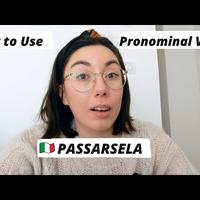How to use Italian pronominal verb PASSARSELA (Come te la passi?) Subs
How to use Italian pronominal verb PASSARSELA (Come te la passi?) Subs.
Cómo utilizar el verbo pronominal italiano PASSARSELA (Come te la passi?) Subs
イタリア語の代名動詞 PASSARSELA の使い方(Come te la passi?)
Como usar o verbo pronominal italiano PASSARSELA (Come te la passi?) Subs
ciao a tutti e bentornati sul mio canale
oggi ci concentreremo su un verbo pronominale che è molto utile per la conversazione quotidiana
today we will focus on a pronominal verb which is very useful for everyday conversation
il verbo in questione è "passarsela"
the verb in question is "passarsela"
le verbe en question est "passe-le"
come si usa questo verbo?
how do you use this verb?
si usa principalmente in due modi
||mainly||two|ways
it is used mainly in two ways
si dice "passarsela bene" e "passarsela male"
||||||bad
is said "having a good time" and "having a bad time"
"passarsela bene" significa vivere in condizioni agiate, stare bene
"having a good time" means living in comfortable conditions, being well
al contrario "passarsela male" significa vivere in condizioni disagevoli, stare male
on the contrary "having a bad time" means living in uncomfortable conditions, feeling bad
queste due espressioni possono essere applicate a vari contesti, a varie situazioni della vita
these two expressions can be applied to various contexts, to various situations of life
vediamo come si coniuga questo verbo pronominale
let's see how this pronominal verb is conjugated
al presente indicativo
present indicative
al passato prossimo
passato prossimo
al passato prossimo - che è un tempo composto - utilizziamo "essere" come ausiliare,
the passato prossimo - which is a compound tense - wants "to be" as an auxiliary,
perché all'interno del verbo pronominale troviamo la particella riflessiva "si"
because within the pronominal verb we find the reflexive particle "si"
coniughiamolo adesso al futuro semplice
let's conjugate it now to the future simple
perché all'inizio vi ho detto che questo verbo
why did I mention that this verb
è davvero molto utile per la conversazione quotidiana informale?
is really useful for informal daily conversation?
perché questo verbo si usa in una domanda molto usata per chiedere a qualcuno come sta
because this verb is used in a question often used to ask someone how they are
"ma come te la passi?"
"but how are you doing?"
quindi è un'alternativa comune e informale alla domanda "come stai?"
so it is a common and informal alternative to the question "how are you?"
la risposta a questa domanda è sempre "bene", "male", eccetera.
the answer to this question is always "good", "bad", etc.
vediamo ora alcuni esempi in contesto
now let's see some examples in context
vedremo insieme alcuni spezzoni di filmati di video in cui viene usato questo verbo
we will see together some video clips in which this verb is used
il primo è un video promozionale di una puntata di un programma ed è del 2016
the first is a promotional video of an episode of a program and it is from 2016
quindi è abbastanza vecchio
so it is quite old
però ci interessa dal punto di vista linguistico
but it interests us from a linguistic point of view
"4 miliardi di persone al mondo se la passano bene, ma lo sviluppo è fermo"
"4 billions people in the world are doing well, but development is at a standstill "
4 miliardi di persone nel mondo se la passano bene
4 billion people in the world are doing well it
significa che vivono agiatamente
means that they
vivono bene
live comfortably
hanno una condizione economica soddisfacente
they live well they have a satisfactory economic condition
passiamo al secondo esempio
let's move on to the second example
questa è la sigla di apertura di un programma di arte
this is the opening theme of tv-show about art
"il mondo della cultura non se la passa bene,
"the world of culture is not doing well,
ma nonostante questo non vuole saperne di stare fermo"
but despite this it does not want to sit still"
pero a pesar de ello no quiere quedarse quieta.
la frase che a noi interessa è "il mondo della cultura non se la passa bene"
the phrase that interests us is "the world of culture is not doing well"
significa che non vive un momento di benessere
means that it is not experiencing a moment of well-being
tutte le attività che fanno parte di questo mondo stanno soffrendo
all the activities that are part of this world are suffering
abbiamo visto i due usi di questo verbo
we have seen the two uses of this verb
quindi "passarsela bene" e "passarsela male"
so "have a good time" and "have a bad time"
e abbiamo visto questi due usi in contesto
and we have seen these two uses in context
se siete interessati allo studio di altri verbi pronominali
if you are interested in studying other pronominal verbs
troverete altre lezioni su questo argomento nella playlist dedicata
you will find other lessons on this topic in the dedicated playlist
grazie ancora
thank you again
e noi ci vediamo nel prossimo video
and see you in the next video
a presto ciao
see you soon bye

